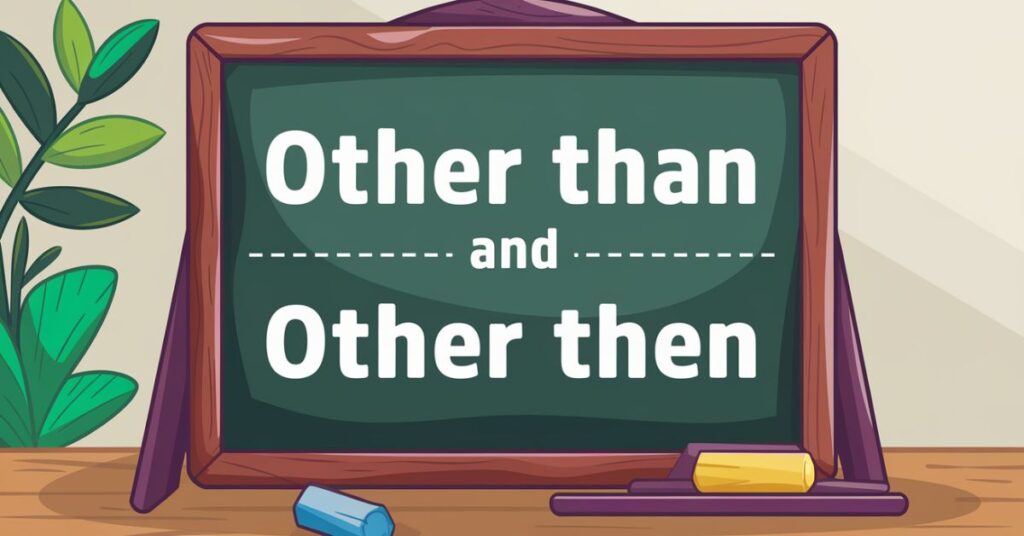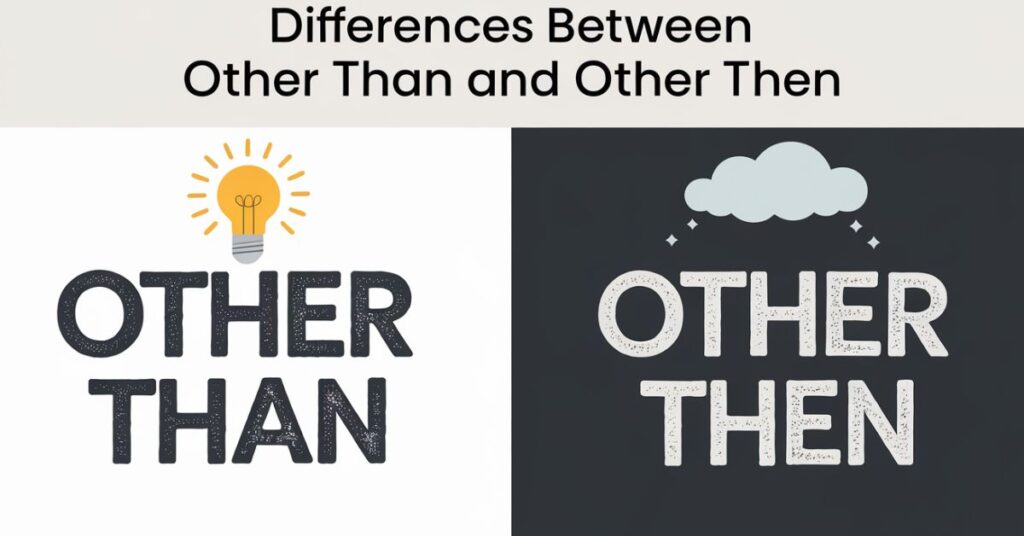Other than or other then are often confused in English. Other than means except for or apart from. It’s used to show an exception or distinction. Other then, however, is usually a mistake.
Have you ever wondered why other then sounds wrong? Many people make this mistake, but it’s easy to fix. Understanding the difference will help your writing sound more natural.
To put it simply, other than is correct when talking about exceptions. Other then is often an error unless referring to time. Knowing when to use each will improve your grammar.

Quick Summary
Let’s get straight to the point: “other than” is the correct term when you want to indicate an exception or distinction. On the other hand, “other then” is almost always an incorrect usage or a grammar error when someone intends to use “other than.” The word “then” is appropriate in certain contexts, typically relating to time or sequence, but it does not work in the phrase “other then” when referring to exceptions or exclusions.
How to Choose the Correct Word
Choosing between other than and other then might seem tricky at first, but it’s simpler than you think. Here’s how to choose the right phrase:
- Use “other than” when you are talking about exclusions or distinctions. It means “apart from” or “except for.”
- Example: “There’s no one other than Sarah who can help with this task.”
- Explanation: In this sentence, we are excluding everyone except for Sarah.
- Avoid using “other then” unless you’re referring to a time-related context. This is a misuse in most cases.
- Example: “If there were other times, then I could have attended the meeting.”
- Explanation: Here, “then” refers to a time or sequence. It is not part of an exclusion or exception.
By simply focusing on context, you’ll know when to use other than and when to avoid other then.
Differences Between Other Than and Other Then

The core difference between “other than” and “other then” lies in their meanings and usage.
- Other Than: This is a prepositional phrase used to indicate exclusion or exception. It means “apart from” or “besides.”
- Example: “No one came other than John.”
- Explanation: Here, everyone except John is excluded.
- Other Then: This phrase is often a typographical error and is not used correctly. However, if we split “other then” and use “then” in a time-related context, it can work.
- Example: “Back then, life was different.”
- Explanation: “Then” here refers to a specific time, not an exclusion.
Other Than: Definition and Usage
“Other than” is used to make distinctions or exclusions. It means apart from or except for. It’s an essential phrase in both casual and formal writing when you want to single out something or someone.
Example Sentences with Other Than:
- “There’s nothing other than a good book that can help me relax.”
- “No one could finish the race other than Ben.”
- “She doesn’t like any type of food other than Italian.”
Synonyms of “Other Than”
There are several phrases that can be used interchangeably with “other than” depending on the context:
- Except for
- Aside from
- Apart from
- Excluding
- Besides
Each of these can be used to create clarity when expressing exclusion or distinction.
Other Then: Definition and Usage
While “other than” is correct, “other then” is typically a misuse. The word then is usually linked with time, not exclusion. This mistake is quite common, especially when writing quickly or casually. But understanding the correct usage of “then” is important.
When is “Then” Correctly Used?
“Then” can be used in contexts that refer to time or sequence:
- “I had no idea back then that it would change my life.”
- “First, we went to the park, then we had dinner.”
These are instances where then is used correctly, but not in the phrase “other then.”
Synonyms for “Then” in a Temporal Context:
- At that time
- Subsequently
- Afterward
- Next
- At that moment
Side-by-Side Comparison
| Aspect | Other Than | Other Then |
|---|---|---|
| Definition | Used to indicate an exception or distinction. | Often a misuse of “other than”; should only refer to time. |
| Common Usage | Exclusions, exceptions, distinctions. | Rarely used correctly; generally a typo. |
| Context | Exclusion or distinction. | Time-based contexts (though incorrect in most cases). |
| Correct Usage | “Other than” is used correctly in most situations. | “Then” is used in temporal contexts but rarely with “other.” |
Everyday Usage Examples
Other Than in Sentences:
- “I couldn’t find anyone other than my brother who had the keys.”
- “There’s no reason other than his laziness that he failed the exam.”
- “Everything was perfect other than the weather.”
Other Then in Sentences:
- “It would have been perfect other then the rain.” (Incorrect)
- “Back then, I didn’t understand the importance of saving.” (Correct use of “then” in a time-based context)
FAQs
Which is correct, than or then?
- Than is used for comparisons (e.g., “greater than“).
- Then refers to time (e.g., “I will see you then“).
What is the rule for than and then?
- Than is used in comparisons, while then is used for time or sequence. Understanding these simple rules will help you avoid confusion.
What do you mean by “other than”?
- “Other than” means “apart from” or “except for.” It is used to exclude something or make a distinction.
Is it more in common than or then?
- “Than” is used more frequently in English since comparisons are made often. “Then” is mostly used for time-related discussions.
What are the synonyms of ‘other than’?
- Some common synonyms for other than are except for, aside from, besides, apart from, and excluding. These alternatives help avoid repetition and can vary depending on the context.
Conclusion
The difference between “other than” and “other then” is a small but important one. Other than is the correct phrase to use when referring to exclusions or distinctions, while “other then” is a misuse in most cases. Understanding when and how to use other than will significantly improve your writing, making it clearer and more professional. By avoiding common mistakes like using “other then” in place of “other than,” you will sharpen your language and communicate more effectively.
To avoid errors, always use “other than” when talking about exceptions or distinctions. This will make your writing clearer and more accurate. Avoid using “other then” unless you are specifically referring to a time-related context. By remembering this simple rule, you can improve your grammar and write more confidently.
With 5 years of experience in grammar, I, Admin, deliver accurate, clear, and reliable content. My expertise ensures top-quality insights in this niche.

